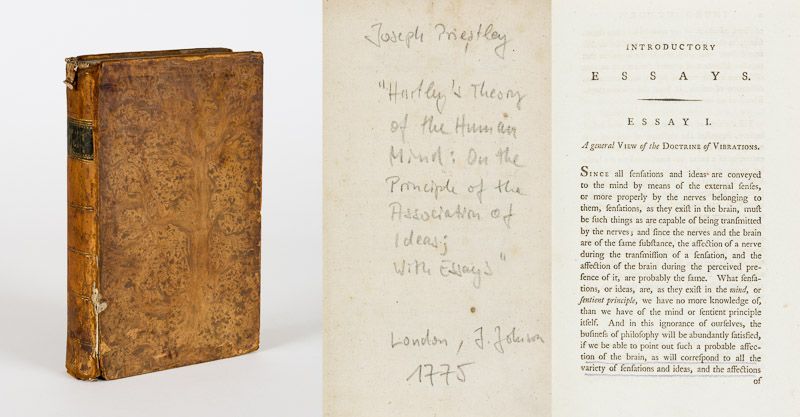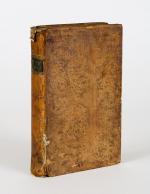[Hartley, Hartley's Theory of the Human Mind: On the Principle of the Associatio
Hartley’s Theory of the Human Mind: On the Principle of the Association of Ideas; With Essays relating to the subject of it.
Second Edition. London, J. Johnson, [1790]. 14 cm x 22 cm. LXVIII, IV, 367 pages. Original Hardcover (contemporary full leather with original spinelabel). Titlepage missing. Part of last page missing (text not affected). Chipping/tearing to spine, otherwise in good condition with binding firm and strong.
Includes the following chapters: Introductory Essays – A general View of the Doctrine of Association of Ideas / Of the Doctrine of Association in General / Of the Sense of Sight / Of the Sense of Hearing / Of Words and the Ideas Associated with Them / Of Propositions and the Nature of Assent / Of the Intellectual Faculties of Brutes / Of the six classes of intellectual Pleasures and Pains (Pains of Imagination / Pains of Sympathy / Pains of the Moral Sense / etc.) / A View of the Doctrine of Philosophical Necessity – General Remarks on the Mechanism of the Human Mind etc.
David Hartley (8 August 1705 – 28 August 1757) was an English philosopher and founder of the Associationist school of psychology.
David Hartley was born in 1705 in the vicinity of Halifax, Yorkshire. His mother died three months after his birth. His father, an Anglican clergyman, died when David was only fifteen. He was educated at Bradford Grammar School and Jesus College, Cambridge, of which society he became a fellow in 1727. Originally intended for the Church, he was deterred from taking orders by certain scruples as to signing the Thirty-nine Articles, and took up the study of medicine. Nevertheless, he remained a member of the Church of England, and was on intimate terms with the most distinguished churchmen of his day. He considered it his duty to obey ecclesiastical as well as civil authorities. The doctrine to which he most strongly objected was that of eternal punishment.
Hartley was married twice. The first time in 1730 to Alice Rowley, who died the next year giving birth to their son David (1731–1813). His second marriage was in 1735 to Elizabeth (1713–78), the daughter of Robert Packer of Shellingford and Bucklebury, both in Berkshire. This marriage was undertaken in spite of the opposition of Elizabeth’s influential and very wealthy family. This union produced two additional children, Mary (1736–1803) and Winchcombe Henry (1740–94). Hartley practised as a physician at Newark, Bury St Edmunds, London, and lastly at Bath, where he died in 1757.
He was a vegetarian. He was elected a Fellow of the Royal Society in 1736. (Wikipedia)
Joseph Priestley FRS (24 March [O.S. 13 March] 1733 – 6 February 1804) was an 18th-century English theologian, English Dissenters clergyman, natural philosopher, chemist, innovative grammarian, multi-subject educator, and Liberal political theorist who published over 150 works.
He is usually credited with the discovery of oxygen, having isolated it in its gaseous state, although Carl Wilhelm Scheele and Antoine Lavoisier also have a claim to the discovery.
During his lifetime, Priestley’s considerable scientific reputation rested on his invention of soda water, his writings on electricity, and his discovery of several “airs” (gases), the most famous being what Priestley dubbed “dephlogisticated air” (oxygen). However, Priestley’s determination to defend phlogiston theory and to reject what would become the chemical revolution eventually left him isolated within the scientific community.
Priestley’s science was integral to his theology, and he consistently tried to fuse Enlightenment rationalism with Christian theism. In his metaphysical texts, Priestley attempted to combine theism, materialism, and determinism, a project that has been called “audacious and original”. He believed that a proper understanding of the natural world would promote human progress and eventually bring about the Christian Millennium. Priestley, who strongly believed in the free and open exchange of ideas, advocated toleration and equal rights for religious Dissenters, which also led him to help found Unitarianism in England. The controversial nature of Priestley’s publications, combined with his outspoken support of the French Revolution, aroused public and governmental suspicion; he was eventually forced to flee in 1791, first to London and then to the United States, after a mob burned down his Birmingham home and church. He spent his last ten years in Northumberland County, Pennsylvania.
A scholar and teacher throughout his life, Priestley also made significant contributions to pedagogy, including the publication of a seminal work on English grammar and books on history, and he prepared some of the most influential early timelines. These educational writings were among Priestley’s most popular works. It was his metaphysical works, however, that had the most lasting influence: leading philosophers including Jeremy Bentham, John Stuart Mill, and Herbert Spencer credit them among the primary sources for utilitarianism. (Wikipedia)
- Keywords: 18th Century – Rare · 18th Century Philosophy · Catalogue No.7 – Religion · Catalogue Twelve – Philosophy · Philosophy · Philosophy of Mind · Philosophy Rare · Religion – Rare
- Language: English
- Inventory Number: 29956AB
EUR 170,--
© 2025 Inanna Rare Books Ltd. | Powered by HESCOM-Software












